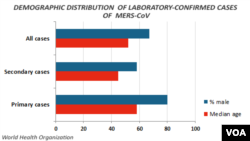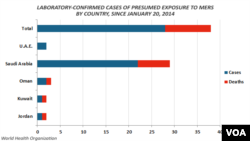WASHINGTON —
Saudi Arabia says a deadly virus is rippling through the kingdom as additional cases were reported over the weekend in the United Arab Emirates and Yemen.
Confirmed cases of Middle East Respiratory Syndrome, or MERS, have been seen at two major hospitals in the port city of Jeddah.
Saudi health authorities are embarking on a variety of measures to prevent further spread of the 18-month-long outbreak.
“We have detected 11 cases of (the virus) in Jeddah,” said Dr. Abdul Salam Noorwali, director-general of health in the Makkah region, told Arab News last week. “Two of the patients have died, while six others have been cured and three cases are under medication,” he said.
Three of the patients in Jeddah were health workers, including one of the two who died, prompting authorities to temporarily shut down the emergency ward at the city's King Fahd Hospital, the kingdom's English-language daily reported.
Sami BaDawood, Jeddah’s health affairs director, told Arab News that the emergency department was closed for disinfection after one health worker there tested positive for the virus and subsequent tests on other staff members showed further infections.
Some patients were transferred to other hospitals while the disinfection was carried out, he said.
The latest figures bring to at least 179 the number of cases of MERS in Saudi Arabia since the virus first appeared in the kingdom in September 2012.
Makkah Governor Prince Mishaal bin Abdullah met with the director-general of health and urged precautionary measures to combat the disease at hospitals and other health facilities, Arab News reported.
“We have to adopt health measures to ensure the safety of citizens and residents from the virus and educate the public on how to protect themselves from MERS,” the English daily quoted him as telling health officials in the region.
Most people infected with MERS develop severe acute respiratory illness with symptoms of fever, cough, and shortness of breath.
The MERS virus is considered a deadlier but less-transmissible cousin of the SARS virus that erupted in Asia in 2003 and infected 8,273 people, nine percent of whom died.
The World Health Organization said at the end of March there were 206 laboratory-confirmed cases of MERS infection worldwide, of which 86 had been fatal.
In April, WHO says, 15 more cases were confirmed in the UAE and Saudi Arabia.
"Basically what MERS does at the end of the day is shutting down the lungs and cause the other organs to fail," Gregory Hartl, a WHO spokesperson in Geneva told VOA.
"It is spreads from person to person with great difficulty and that is how it is different from SARS," Hartl said. "What we really need doctors to do if they see unusual respiratory illness comes to them in other parts of the world is to be aware that MERS has occurred and they should test for that virus."
Experts are still struggling to understand the disease, for which there is no known vaccine.
“We don’t know for certain where the virus came from,” said Jason McDonald, spokesperson for U.S. Center for Disease Control (CDC). “However, it likely came from an animal source.”
MERS has been found in camels in Qatar and a bat in Saudi Arabia.
Camels in a few neighboring countries have also tested positive for antibodies to MERS, indicating they were previously infected with MERS or a closely related virus.
More information is needed to identify the possible role that camels, bats, and other animals may play in the transmission of MERS.
That is why the CDC is closely monitoring the MERS situation and working with World Health Organization and other partners to understand the risks of this virus.
The CDC says it recognizes the potential for the virus to spread further and cause more cases and clusters globally, including in the United States.
“As part of routine public health preparedness in the United States, CDC is providing MERS testing kits to state health departments across the U.S. and continues to provide advice and laboratory diagnostic support to countries in the Arabian Peninsula and surrounding region.” McDonald said.
According to CDC, cases have been reported in Saudi Arabia, Qatar, Kuwait, Jordan, United Arab Emirates, Oman and Tunisia as well as in several countries in Europe.
Confirmed cases of Middle East Respiratory Syndrome, or MERS, have been seen at two major hospitals in the port city of Jeddah.
Saudi health authorities are embarking on a variety of measures to prevent further spread of the 18-month-long outbreak.
“We have detected 11 cases of (the virus) in Jeddah,” said Dr. Abdul Salam Noorwali, director-general of health in the Makkah region, told Arab News last week. “Two of the patients have died, while six others have been cured and three cases are under medication,” he said.
Three of the patients in Jeddah were health workers, including one of the two who died, prompting authorities to temporarily shut down the emergency ward at the city's King Fahd Hospital, the kingdom's English-language daily reported.
Sami BaDawood, Jeddah’s health affairs director, told Arab News that the emergency department was closed for disinfection after one health worker there tested positive for the virus and subsequent tests on other staff members showed further infections.
Some patients were transferred to other hospitals while the disinfection was carried out, he said.
The latest figures bring to at least 179 the number of cases of MERS in Saudi Arabia since the virus first appeared in the kingdom in September 2012.
Makkah Governor Prince Mishaal bin Abdullah met with the director-general of health and urged precautionary measures to combat the disease at hospitals and other health facilities, Arab News reported.
“We have to adopt health measures to ensure the safety of citizens and residents from the virus and educate the public on how to protect themselves from MERS,” the English daily quoted him as telling health officials in the region.
Most people infected with MERS develop severe acute respiratory illness with symptoms of fever, cough, and shortness of breath.
The MERS virus is considered a deadlier but less-transmissible cousin of the SARS virus that erupted in Asia in 2003 and infected 8,273 people, nine percent of whom died.
The World Health Organization said at the end of March there were 206 laboratory-confirmed cases of MERS infection worldwide, of which 86 had been fatal.
In April, WHO says, 15 more cases were confirmed in the UAE and Saudi Arabia.
"Basically what MERS does at the end of the day is shutting down the lungs and cause the other organs to fail," Gregory Hartl, a WHO spokesperson in Geneva told VOA.
"It is spreads from person to person with great difficulty and that is how it is different from SARS," Hartl said. "What we really need doctors to do if they see unusual respiratory illness comes to them in other parts of the world is to be aware that MERS has occurred and they should test for that virus."
Experts are still struggling to understand the disease, for which there is no known vaccine.
“We don’t know for certain where the virus came from,” said Jason McDonald, spokesperson for U.S. Center for Disease Control (CDC). “However, it likely came from an animal source.”
MERS has been found in camels in Qatar and a bat in Saudi Arabia.
Camels in a few neighboring countries have also tested positive for antibodies to MERS, indicating they were previously infected with MERS or a closely related virus.
More information is needed to identify the possible role that camels, bats, and other animals may play in the transmission of MERS.
That is why the CDC is closely monitoring the MERS situation and working with World Health Organization and other partners to understand the risks of this virus.
The CDC says it recognizes the potential for the virus to spread further and cause more cases and clusters globally, including in the United States.
“As part of routine public health preparedness in the United States, CDC is providing MERS testing kits to state health departments across the U.S. and continues to provide advice and laboratory diagnostic support to countries in the Arabian Peninsula and surrounding region.” McDonald said.
According to CDC, cases have been reported in Saudi Arabia, Qatar, Kuwait, Jordan, United Arab Emirates, Oman and Tunisia as well as in several countries in Europe.






